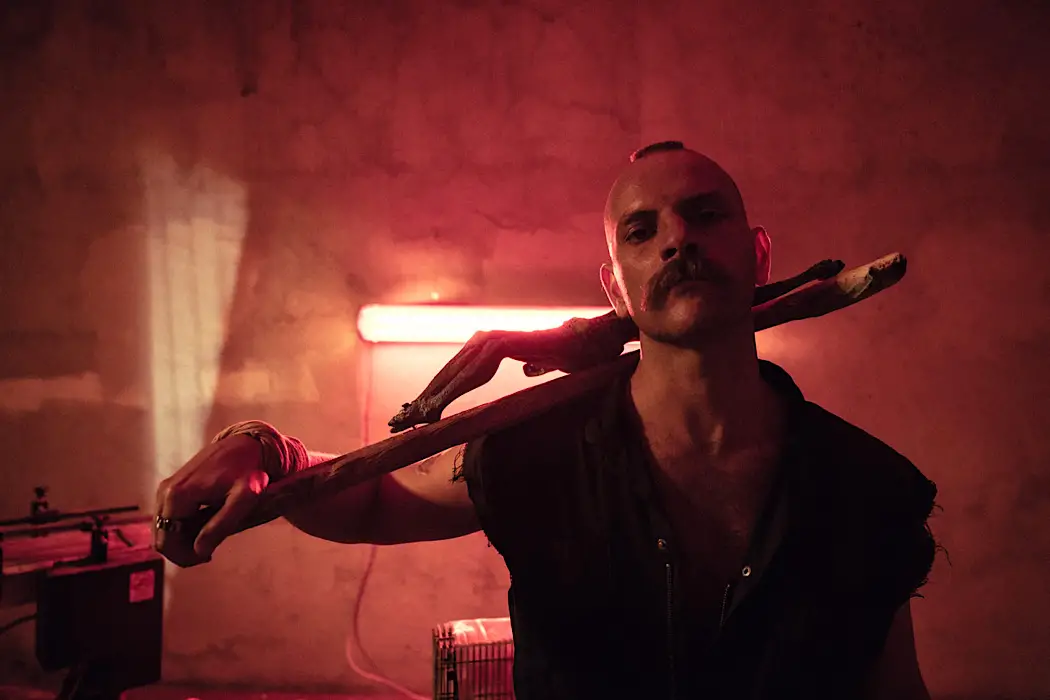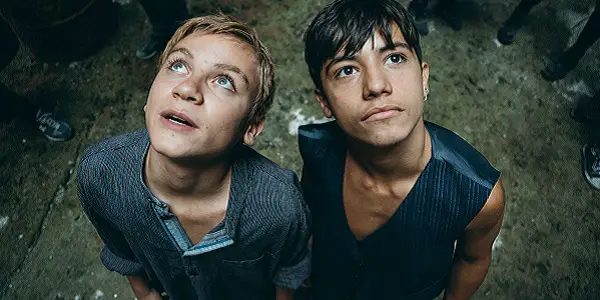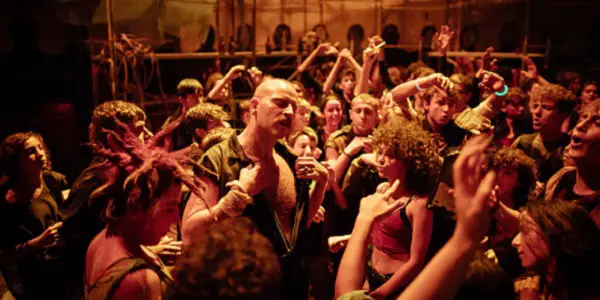MONDOCANE: Dystopia, Italian Style

Lee Jutton has directed short films starring a killer toaster,…
The latest feature from writer-director Alessandro Celli, Mondocane—not to be confused with the shock doc of a similar name released in the 1960s—depicts a near-future Italy where the southern city of Taranto has become a wasteland, surrounded by barbed wire and ruled by warring gangs. Here, crime not only pays, but it’s also basically the only way to survive—hence why two teenage boys dream of escaping their hardscrabble waterfront existence to join the most infamous gang of them all. Yet despite a keen sense of style and some great performances from the young cast, Mondocane fails to truly capture the imagination in the way so many other dystopian thrillers have done before.
Hard Knock Life
Pietro (Dennis Protopapa) and Cristian (Giuliano Soprano) are orphans nominally in the care of an old fisherman who spends more time berating them—and, we soon learn, sexually abusing them—than he does actually raising them. The boys long to live lives of comfort and privilege in New Taranto, the city that was rebuilt on the other side of the barbed wire. Instead, they settle for joining the Ants, a powerful local gang run by a man known as Testacalda, or Hothead (Alessandro Borghi).

To prove their worth to the Ants, Pietro and Cristian have to blow up a pet shop that is also being used as a drug front. (Not sure why so many movies, especially as of late, have to rely on killing animals as a way to convey characters’ brutality, but I digress…) Upon successfully completing their mission, Pietro is given the name of the shop—Mondocane, or Dog World—and invited to join the gang. However, Cristian, who suffers from periodic seizures, is deemed too weak and sick to come along. A devoted friend above all else, Pietro refuses to accept this and brings Cristian with him to the Ants’ secret hideout anyways.
Cristian is given the name Pisciasotto or Piss Pants, and quickly proves to the rest of the gang that he’s willing to do whatever it takes to be accepted by them. Indeed, Cristian’s reputation among the Ants quickly supersedes that of Pietro, whose inability to commit coldblooded murder at Hothead’s request threatens his position in the group. Pietro and Cristian also end up in conflict over their burgeoning friendship with another orphan, Sabrina (Ludovica Nasti), who lives in New Taranto and doesn’t know the boys are members of the Ants. It’s clear Pietro is too inherently kind and sensitive for this kind of cutthroat life; the question is whether he will be able to escape the gang and start anew before someone—perhaps Hothead, perhaps the cops, perhaps even Cristian—kill him first.
Deja Vu
Mondocane cobbles together elements of everything from Oliver Twist to Mad Max to tell a story of friendship in a post-apocalyptic world where hardly anything else has managed to survive. Yet the sum of these parts is a film that felt far too familiar and, as a result, failed to fully engage me. Desperate children committing acts of shocking violence, a charismatic father figure that would just as quickly kick you in the face as kiss you goodnight, characters clad in artfully scavenged clothing that shows off the women’s figures to maximum effect, a vibrant musical score reminiscent of your favorite 1980s thrillers…everything in Mondocane has been seen before in other, better movies than this one.

Nonetheless, the performances of the actors playing the three central child characters—Pietro, Cristian, and Sabrina—are strong. Protopapa instantly conveys the sensitivity that threatens to be Pietro’s downfall, while Soprano ensures that even if you do not sympathize with Cristian’s betrayal of Pietro, you at least can understand why he would end up doing such a thing. And as Sabrina, Nasti is equal parts tough and sweet, a gentle soul who has developed a hard protective shell in order to survive the difficult life she has led thus far. Watching the three of them, especially in their scenes together, provides an incredibly interesting look at the resilience of children and their relationships even in the darkest times; it’s when Hothead and the other adults get involved—including a former orphan-turned-female cop who strives to be Sabrina’s mentor—that Mondocane becomes much more derivative.
The film is well shot, with Giuseppe Maio’s cinematography emphasizing how the golden Mediterranean light manages to make even the most unattractive places and people glow. This makes the film’s stylish vision of a dystopian Italian coast even more visually striking, especially in the desolate old city where the Ants reign supreme. Indeed, the Italian setting is the main thing that helps Mondocane stand out from the sea of other, familiar films out there—but it’s still not enough to make this a must-see.
Conclusion
Mondocane would be a much more entertaining film if one wasn’t struck by the strange feeling we’ve seen most of this before.
What do you think? What are some of your favorite dystopian thrillers? Share your thoughts in the comments below.
Mondocane opens in theaters in the U.S. on May 20, 2022. You can find more international release dates here.
Watch Mondocane
Does content like this matter to you?
Become a Member and support film journalism. Unlock access to all of Film Inquiry`s great articles. Join a community of like-minded readers who are passionate about cinema - get access to our private members Network, give back to independent filmmakers, and more.
Lee Jutton has directed short films starring a killer toaster, a killer Christmas tree, and a not-killer leopard. Her writing has appeared in publications such as Film School Rejects, Bitch: A Feminist Response to Pop Culture, Bitch Flicks, TV Fanatic, and Just Press Play. When not watching, making, or writing about films, she can usually be found on Twitter obsessing over soccer, BTS, and her cat.












